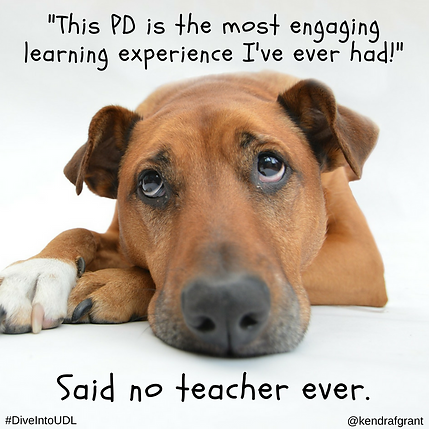


Chapter 2: Professional Development versus Professional Learning

These two terms are often used interchangeably, however in practice they are as different as traditional lectures are to experiential learning.
Professional Development (PD) is often an event, lead by an expert, and determined and directed by others. It occurs outside of the classroom. PD is often designed to ensure consistency (across a school or district) and compliancy (everyone knows or does the same thing).
Evidence suggests PD is ineffective as a change mechanism.
PD has an ownership problem.
Professional Learning (PL) is an iterative process, determined and directed by the educator. It occurs in the classroom, with your students. PL is designed to address (personal and professional) questions of practice with the goal of continuous improvement.
While PD is not necessarily bad (i.e., workshops can introduce you to new tools or methodologies and keynotes can inspire you) it is only the "side kick" of professional learning, helpful but secondary. Professional learning is the hero, the driver of the action. It affects change.
Apps and Resources

Pause and Reflect
We've compiled the pause and reflect questions from the book into a Google Doc.
Feel free to make a copy and work inside the document, or record your thoughts using another form of media.

Five Flaws of Current Teacher PD (Hargreaves, 2007)
-
Presentism: the focus on short term fixes to large-scale problems in the education system
-
Authoritarianism: the top-down planning without teacher input
-
Commercialism: relying on "big names" in PD
-
Evangelism: telling teachers they are teaching incorrectly and thus experts are needed to fix them
-
Narcissism: the thought that how professional development is conducted is more important than what is actually learned

Wade In:
Professional Learning rather than Professional Development
The article: From Action Research to Collaborative Inquiry explores the differences between professional learning and professional development, and outlines collaborative inquiry as one way to deeply explore questions related to student learning and classroom practice.
Using the image to the right, consider whether you engage in professional development or professional learning, and what you might do to embrace PL.
This short video from Australia visually outlines the key components of Professional Learning. Although the context is international, the video emphasizes the necessity for teachers to be #LearnersFirst.
This blog "Personal Learning Network (PLN) Benefits, Tools, and Tactics" provides a good overview of the difference between PLNs and PLCs, which also happens to align nicely with the topic of this chapter. A good link to share with administration or for those who say "po-ta-to - po-tat-o". There really is an important difference.

Shallow Swim:
Effective Professional Learning
Collaboration is not the same thing as collaborative inquiry. Collaborative inquiry is focused on intentional disruption. It requires a diversity of opinion (not everyone agreeing or coming to consensus), independence to pursue ideas, and aggregation (and sharing) of the lessons learned.
"Now every time you say the phrase 'collaborative inquiry' I want you to say the rest of the phrase: 'That challenges thinking and practice.' ...collaboration isn't the same as collaborative inquiry. It's not the same thing. The together part is kind of the easy part. The inquiry that challenges thinking and practice is the harder part."
We whole heartedly agree.
Think about the "collaborative" meetings you attend. Are they focused on consensus and completion of a task, or are they focused on the hard work involved in working through uncomfortable ideas and changing "what we do around here?"
Video Transcript
For a continuation of the presentation view the video What Counts as Professional Learning
Continuum of Ownership
In this blog post "Continuum of Ownership: From Compliance to Autonomy", Barbara Brey is referring to students.
We believe this continuum can also apply to you and your professional learning. Take a moment to consider where you (and you school or district) are on the continuum: Compliance, Understanding, Investment, Autonomy.
Deep Dive:
Learning Forward - Professional Standards
"The decision to call these Standards for Professional Learning rather than Standards for Professional Development signals the importance of educators taking an active role in their continuous development and places emphasis on their learning."
The updated standards (April 2022) - Kickoff Week resources - and the Learning Forward Standards page, offer insight into connecting professional learning with improved student achievement.
As you read through these resources, remember that an important part of professional learning is ownership, self-driven learning. Reflect on whether your voice and choice is evident and how this blends with larger school and district initiatives.
Visit the Learning Forward website to take a deeper dive into the standards.
Change the Terms for Teacher Learning
"Professional Development as a term and a strategy has run its course."
It is always interesting to read articles that remind us just how long we've been talking about change. In this article, written about teacher professional learning by Michael Fullan (before Learning Forward changed its name), he called for a radical change in what teacher learning should look like and sound like.
Are we there yet?
In your school or district, who currently owns the learning?
Have you changed the name but not the intent?
Are teachers exploring meaningful but difficult questions that require a change in practice? Or are they learning tips, tricks and strategies?






